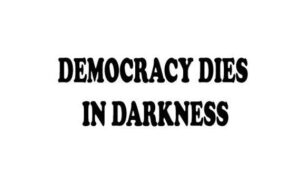Carole Cadwalladr
How Democracy Dies
August 30, 2020
Carole Cadwalladr is a British author and investigative journalist/The Observer.
“We are what happens to a western democracy when a hundred years of electoral laws are disrupted by technology. Is this what we want? To let them get away with it?”
A Kenosha Militia Facebook Event Asking Attendees To Bring Weapons Was Reported 455 Times. Moderators Said It Didn’t Violate Any Rules. It remained up. Two people were shot dead. Then it came down.
Their excuse? ‘Operational mistake.’
https://www.buzzfeednews.com/article/ryanmac/kenosha-militia-facebook-reported-455-times-moderators
Free Press:
“Over and over again Facebook fails to stop the glorification and celebration of white supremacist violence. It’s disgusting and unacceptable.”
Jay Rosen, Journalism professor at NYU:
“The conservative commentator Ben Shapiro has gotten 56 million total interactions on his Facebook page in the last 30 days. That’s more than the main pages of ABC News, NBC News, The New York Times, The Washington Post and NPR combined.”
Seth Godin, author and former ‘dot com’ business executive:
‘Systemic problems demand systemic solutions.
First, we have to pay attention.
Then we need to acknowledge that a solution is possible.
And then we need to commit. To the long, persistent road to altering the status quo.
The world is forcing us to pay attention to lingering problems more urgently than ever before. Real change on issues of dignity, justice and health are long overdue
Urgent problems are too important to earn only a moment of our attention. Important projects demand that we keep showing up to make the change we seek. Showing up and showing up, at the root and at every turn, consistently working toward systemic solutions.
When we think about the problems we’ve solved as a community, this is the way it always happens. Making things better, over time, with focus. Persistent commitment doesn’t lower the urgency of the moment, it acknowledges it.’
Kevin Roose, NY Times Columnist:
“If you don’t think DT can get re-elected in November, you need to spend more time on FB. The result is a kind of parallel media universe shaping its own version of reality.”
August FB interactions:
CNN: 21 million
NYT: 8M
Ben Shapiro: 55M
August FB video views
CNN: 73M
NYT: 12M
The Hodgetwins: 84M
August FB shares:
CNN: 2.2M
NYT: 800K
Dan Bongino: 5.6M
CNN’s Brian Stelter talks ‘Citizens Agenda’
#MSM
The news media needs a reset.
Jay Rosen explains ‘Citizen’s Agenda.’
The Citizens Agenda is a model for generating more responsive, inclusive & useful news coverage for voters.
www.thecitizensagenda.com
Center for Action & Contemplation, Aug. 28th:
‘Group egocentricity is even more dangerous than personal egocentricity. It looks like greatness when it is often no more than disguised egotism. Loyalties at this level have driven most of human history—and most wars—up to now.’
Local journalism needs us.
April 6, 2020‘Journalism faces an extinction event.’ If you value democracy, please buy a paper today or subscribe to a news organisation. We are an industry that has been battling for years but COVID-19 is an existential threat to independent journalism everywhere.’
-Carole Cadwalladr, The Guardian & The Observer
Facing a possible “extinction event” for independent media worldwide, journalists must work together globally to combat a triple threat of disinformation, government restrictions and economic calamity worsened by the COVID-19 pandemic, three top editors said during an ICFJ webinar Friday.
Maria Ressa, the founder of Rappler in the Philippines, said that although her outlet is in a comparatively secure financial position, many other news organizations globally are at risk of collapse. And the result could be that many citizens might not be able to count on independent media to continue to provide factual information free of government control once the shock waves of the pandemic have subsided.
-The International Center for Journalists (ICFJ)
The Sandpoint Reader in Sandpoint, Idaho, was forced to lay off most of its staff after it lost advertising revenue due to the COVID-19 pandemic.
The Mountain West News Bureau
Newspapers Face Existential Question: How To Cover The Pandemic When There’s No Money?
By Nate Hegyi
Ben Olson is exhausted.
‘Olson appears close to burning out, trying to keep his readers up-to-date with the latest COVID-19 news. The region has dozens of confirmed cases and, like the rest of the country, that number is growing. But at the same time, the number of reporters and staff at the Reader has shrunk – from four down to just one: Olson.
“I want to get my staff back to work because, number one, they’re like my family and I feel responsible for them,” he says. “But number two – I just cannot handle this by myself.”
Olson had to lay off his staff after local restaurants and bars shut down in an effort to curb the spread of COVID-19. Those businesses often advertised events in the Sandpoint Reader’scalendar. But no events mean no money.
“I realized very quickly that I would probably make one or possibly two more payroll cycles and then I would be completely bankrupt,” he says.
It’s a problem that’s reverberating throughout the Mountain West’s media landscape. The COVID-19 pandemic is deepening the cracks and fissures in a centuries-old business model, one that traditional newspapers and alternative weeklies still rely on.
There are no journalists without robust advertising dollars to pay for them, and money from subscription and circulation revenues can only go so far – they often cover less than half of a newspaper’s expenses.
So, from the Sandpoint Reader to the Bozeman Daily Chronicle and Missoulian in Mont., to the Buffalo Bulletin in Wyo. and Westword in Denver, media companies are cutting hours and laying off staff.
“This is a real disaster for media that are supported by advertising in general,” says Ben Smith, a media columnist for the New York Times who recently wrote an op-ed titled “Bail Out Journalists. Let Newspaper Chains Die.”
He points out that many traditional newspaper chains were on life support before the pandemic – they’ve been cutting costs by shutting down papers and laying off staff. COVID-19 just sped up the clock and Smith doesn’t expect a happy ending.
“I think we’re going to wind up with fewer journalists next year than this year, just as it has been for the past several years,” he says.
“I think there is an increasing recognition that journalism is a public service,” he says. “It’s a utility like water or electricity, in terms of keeping a community going and is an appropriate outlet for philanthropy.”
It’s a business model that has been adopted by an increasing number of news outlets across the Mountain West. Late last year, The Salt Lake Tribune became the first legacy newspaper to transform itself into a nonprofit organization. Montana Free Press embraced the nonprofit model when it launched a few years ago.
“Most of our revenue comes from members who donate to us like they would to public radio,” says John S. Adams, editor-in-chief of Montana Free Press.
Currently the outlet is doing well financially, he says. They’ve seen skyrocketing readership and an uptick in donations during the pandemic.
This story was produced by the Mountain West News Bureau, a collaboration between Wyoming Public Media, Boise State Public Radio in Idaho, KUNR in Nevada, the O’Connor Center for the Rocky Mountain West in Montana, KUNC in Colorado, KUNM in New Mexico and with support from affiliate stations across the region. Funding for the Mountain West News Bureau is provided in part by the Corporation for Public Broadcasting.


